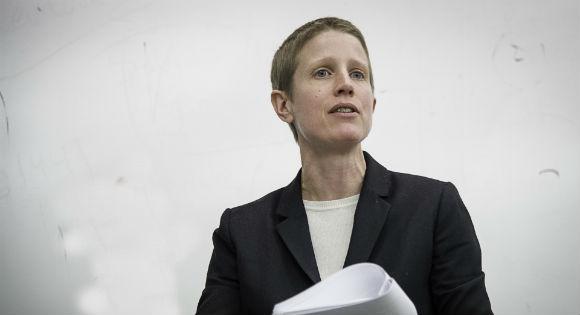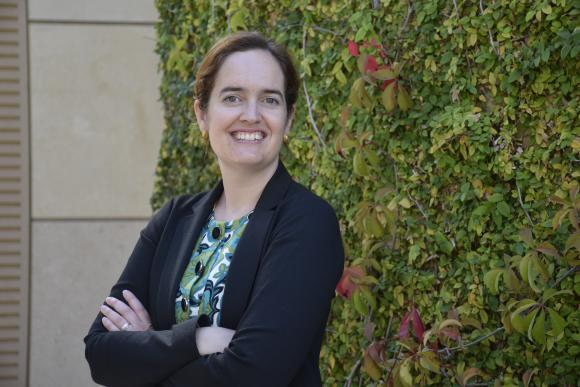Rutgers Law professors are national experts in a number of fields and widely-published in those areas. Recently, they weighed in on some of the key legal issues that will be discussed and debated in the upcoming year.

Katie Eyer
Professor of Law
There are a number of important issues on LGBTQ rights to watch in the upcoming year. In the case of Fulton v. City of Philadelphia, the Supreme Court will address the ability of discriminating entities to use First Amendment religious liberties arguments as a shield against discrimination claims or sanctions. Historically, courts have found that anti-discrimination laws are “neutral laws of general applicability” the enforcement of which does not generally trigger religious liberties scrutiny. It will be important to watch in Fulton what result the Court reaches, as well as what reasoning it utilizes (since a narrow holding could have relatively limited implications, whereas a broad holding could have very wide implications). The implications of the Supreme Court opinion in Bostock v. Clayton County (holding that LGBTQ employees are covered by Title VII’s sex discrimination protections) also continue to be developed in the lower courts, across a host of contexts, and will be important to watch. Finally, there are many questions about how the LGBTQ rights movement will direct its advocacy and resources in the wake of Bostock, and how the rights gains of the past two decades will translate to those who continue to face the highest levels of disadvantage within the LGBTQ community.

Alan Hyde
Distinguished Professor of Law
Employment law changes will continue to come at the state and local level as Congress will remain deadlocked and Republican federal judges will hamstring regulatory initiatives by the Administration. New Jersey has already joined the progressive states in banning inquiries into criminal convictions, protecting against discrimination for hair style, and broadening the legal definition of employee. New York City has just enacted job security protection for fast food workers and this will become the new issue in progressive states. There may be new attention to employment law enforcement, creating stronger state enforcement agencies and relying less on litigation. Immigration law: It will be difficult for the Administration to do more than roll back the unilateral regulatory initiatives of the last Administration. Resources will be shifted from enforcement to visa processing.

Thea Johnson
Associate Professor of Law
This past year made clear that there is a tremendous appetite for meaningful criminal justice reform across the country. In 2021 we’ll see if this momentum continues and what it could produce. There are three major trends to watch for. The big one is how the Biden administration will shape the Justice Department. There is no doubt that the Justice Department under President Biden will look dramatically different than it did under Trump, but that doesn't necessarily mean that the office will be committed to a vision of progressive reform. The current choice for Attorney General is Merrick Garland, who is not considered a firebrand on these issues. But other picks for the department do come from the progressive sphere and might mean true criminal justice reform (at least in certain areas) is possible. But the federal system only accounts for a small portion of the massive criminal justice machinery in this county. So next up it will be fascinating to see what happens at the state level. Oregon voters just passed a ballot measure to decriminalize personal possession of all drugs. Here in New Jersey voters legalized marijuana. Will this trend continue to spread to other states? If so, that’s a major shift in substantive criminal law. Finally, at the local level, will “progressive prosecutors” continue to get elected? In many ways this is the most critical question because -- no matter what the law on the books -- it’s the prosecutors who choose how and when to enforce those laws.

Randi Mandelbaum
Distinguished Clinical Professor of Law
Immigrants have been under attack over the last four years by the Trump administration. In fact, the Immigration Policy Tracking Project has counted that this administration has taken 1030 actions since 2017 involving immigration, almost all of them negative and against the interests of immigrants. I have been particularly concerned about the plight of unaccompanied minors, children who escape to this country alone, without a parent or guardian. These children have been forced to live in large congregate care facilities, similar to jails and detention centers, and they have been stripped of many procedural protections, making it much more difficult for them to seek a pathway to lawful permanent resident status (a "green card"). For example, the Trump administration has changed the policies and procedures which afford protection to children who have been abused, neglected, or abandoned by at least one parent. This form of immigration relief is called Special Immigrant Juvenile status (SIJS). Specifically, it is now harder for them to be approved for SIJS and, even if they have been found eligible for SIJS, the government is still trying to deport many of the children while they wait to be able to apply for their green cards. Unaccompanied minors also are able to argue their asylum cases out of court, in a more informal setting called an Asylum Office. However, the Trump administration has enacted procedures to limit the ability of older youth to be able to do this. Because of other actions by the Trump administration, it also is much harder for children and adults who have been the victims of family violence to apply for asylum. And children fleeing to the U.S. with a parent, planning to seek asylum in the U.S., have been forced to remain in dangerous and extremely unhealthy and unsanitary tent camps in Mexico, through a policy called the Migrant Protection Protocols (MPP), instead of being permitted to enter the United States while their asylum case is pending. It will be interesting to watch the Biden administration to see how quickly and how expansively (or not) it works to undo the many policy and regulatory changes that were implemented over the last four years. I am particularly interested to see if the MPP program is ended; if the many agency decisions and rules that put restrictions on access to asylum are rescinded, especially decisions by the Attorney General; if efforts to deport children who have been found to be eligible for SIJS, or who would be eligible for SIJS, cease; and finally, if there are any improvements in the conditions in which unaccompanied children are forced to reside when they arrive in this country.

Sarah Ricks
Distinguished Clinical Professor of Law
Should a local government be forced to contract with a social service agency that violates the local government’s anti-discrimination law? Or is there a First Amendment religious exception to local antidiscrimination law? The U.S. Supreme Court soon will decide. The case concerns the First Amendment free exercise clause. A Catholic foster care agency challenged Philadelphia’s application of its antidiscrimination law. Catholic Social Services wishes to contract with Philadelphia to provide foster care but, based on its religious beliefs, will not allow same-sex couples to be foster parents. The Third Circuit held Philadelphia complied with the First Amendment. The Third Circuit affirmed that the City has the right to require contractors who provide City-funded child welfare services to comply with its non-discrimination requirements. It held Catholic Social Services could not demand a religious exception to avoid working with qualified same-sex couples because of its religious objections. The Supreme Court granted certiorari to decide, in part, “whether the government violates the First Amendment by conditioning a religious agency’s ability to participate in the foster care system on taking actions and making statements that directly contradict the agency’s religious beliefs.” The Philadelphia antidiscrimination agency on which I’ve served as a Mayoral appointee since 2008 is among the defendants in the case, Fulton v. City of Philadelphia. Famed Supreme Court litigator Neal Katyal argued it in November 2020. SCOTUS blog recently published a symposium on the issues.